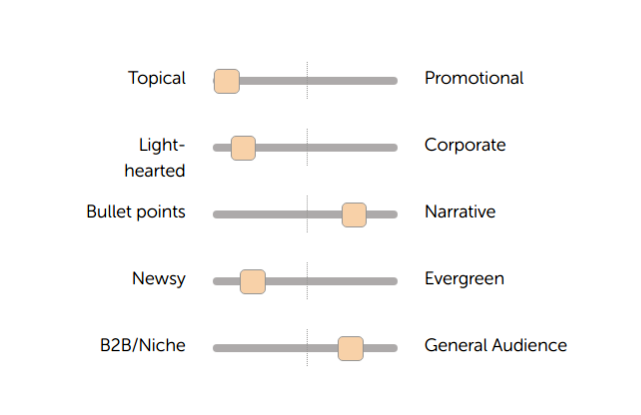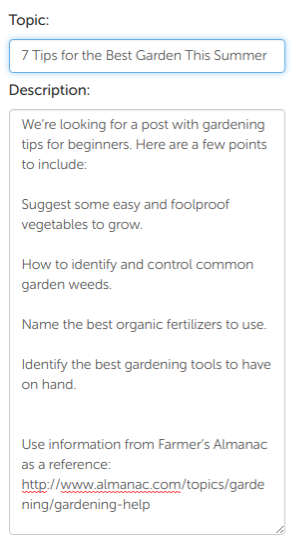An SEO content writer can get your blog noticed, provide valuable information to your readers, and help your business achieve its marketing goals. But, how do make sure your writer meets your expectations? Providing your writer with the right information will help them create awesome content that also, importantly, hits on your SEO goals.
What Your SEO Content Writer Probably Doesn’t Know
1. SEO Goals
We set goals in every aspect of life—especially in business. Goals motivate us and guide us towards success. Without goals to keep us on track, we run the risk of becoming aimless and much less productive.
To be successful at SEO, like anything else, you need to have clear goals defined. If you’re not sure which goals to set, business leader Samantha Owens Pyle suggests three common goals to businesses who are new to SEO.

Here is a list of some common SEO goals for businesses:
- Rank on page one of Google’s search results for certain keywords.
- Develop high-quality content that includes reputable links from websites with higher domain authority.
- Become a go-to educational source in your industry or niche.
- Grow brand awareness.
- Increase online store purchases.
- Increase leads via inquiries or consultations as calls-to-action on posts.
- Build & foster customer loyalty.
Why does your SEO content writer need to know your SEO goals? Your SEO goals directly affect your strategy, which includes how you talk to your target audience, which keywords you implement, and what tone and style you use. Consider your SEO writer an extension of your internal team. Wouldn’t you need your team to know these things too, in the name of transparency?
For example, if your SEO goal is to become a reputable source of information in your industry, your target audience may consist of other businesses, industry professionals, and even schools. To speak to this audience, your writers must create educational content that shows a high level of expertise and is written at a formal level.
But, if your SEO goal is to increase online store purchases, your target audience is the digital consumer. To appeal to the consumer, your writer needs to create content that offers solutions to their pain point in an entertaining way while including links to your products to encourage sales. Your writer will try to present the content in a more personal and narrative manner to connect with the consumer.
If the writer doesn’t know your goals as an extension of your team, they cannot effectively carry out a strategy, plain and simple. So, no matter what your SEO goals are, make sure your writer knows them, too. After all, you’re going to have trouble reaching those goals without an SEO writer.
2. Keywords
Keywords are the search terms that your target audience is likely to use to find your blogging content, and in turn, your website as well.

SEO content writers need to know your target keywords because they will be including them in every piece of content they write. For example, as listed in our SEO checklist, keywords should ideally be included in the title tag, URL, body text, meta description, H1 tag, and, if appropriate, the alt text for images.
If you don’t have any keywords, you’ll have to get started on some keyword research. Just remember that keywords must make sense for both your audience and the search engine, and they should be used naturally throughout the post (no stuffing!). After all, the whole point of hiring an SEO content writer is to provide meaningful content for your readers, and not the search engines, right?
Ready to step up your SEO game? Use keyword clustering (or keyword grouping) to enhance your SEO results. Group keywords together that are relevant to each other to identify content writing opportunities and improve search engine rankings.
Want to learn more about keyword clustering? Check out SearchEngineLand’s article for keyword clustering tips and tools.
3. The Sound & Feel of Your Ideal Post
Having the right sound and feel in your blog posts makes all the difference to your readers. An SEO content writer can encompass the personality of your business and make readers feel comfortable.
To do this, they need to write with a specific tone and style in mind.
Here are a few questions you should answer to guide your writer:
- Should the writing be topical or promotional?
- Should the writing be evergreen or newsy?
- Are the blog posts aimed at a more general or a more specific, niche audience?
- How technical should the level of writing be?
- What level of expertise or researching does your target audience expect?
Even the format of your posts matters to your readers. Will your target audience prefer bullet point lists or narratives? If you are not sure, research successful business bloggers in your industry and read a few blog posts yourself. Or, just jump in and start experimenting. Run a couple tests at a time and cross-reference your metrics to see what’s resonating.
So what’s the best way to communicate these things to your writer? By example. Send your writer articles that you want to emulate (thus, ideal post). These can be your own articles, or they could be from another business’s blog that is doing it right by your standards. Trust us, your writer will appreciate that effort!
Here’s How To Do It In The Verblio System
1. Make “need to know” information readily available.
Compile a packet (or even just a blurb) of “need to know” information to set expectations for your new writer and get them up to speed, fast. This should include your SEO goals (or other goals), target audience, and brand guidelines, as well as a list of keywords, and even an editorial calendar. You can even provide examples of blog posts that you would like to emulate.
2. Communicate mindfully with your writer.
Start off strong by making your topic prompts detailed, descriptive, and organized. The better organized your topic description is, the better content you will receive. Be sure to include any reference links or examples that the writer should take note of to use as jumpstarts to the post or models for the post you’re expecting as a result. Your writer may still have a few questions, but chances are you will have a draft that is pretty close to your expectations in no time if you’re able to do this.
Provide feedback on every piece of writing whether you like it or not. Be sure to specifically state what you did or did not like about each piece. A simple “I just don’t like this post” isn’t going to be constructive for the writer. Read more on constructive feedback here.
Make sure your revision requests are specific and realistic. Maybe the writer didn’t go into enough detail in a how-to article, or maybe you would like them to add a specific piece of information. Go ahead and request these changes. If the revisions are quite simple, like a few typos, it’s probably faster for you to claim the post and just make those quick changes yourself.
Finally, stay professional with your writer. Differences in opinion and moments of confusion may arise. But remember, your writer wants to provide you with effective content. So, do your best to communicate with them in a positive (even when delivering negative feedback) and constructive manner.
3. Verblio can take SEO content writing to the next level.
Sound overwhelming? Not sure if you can keep track of all this?
At Verblio, we will collect information immediately on the sound and feel you want for your blog, and what topics you want to write about. Our platform helps you convey all the necessary information that your writer needs to know.
Here are the best places in the Verblio platform to add information that your writers need to know:
Other Information
The “Other Information” box is the best place to write general guidelines that apply to all of your blog posts. Include your SEO goals, target audience, any keywords that should be included in all of your posts, and other requirements here.
You can also describe any DOs and DON’Ts that your writers should always follow.

Sliders
Use these sliders to tell your writers the tone and style your posts should have. Keeping these sliders at the middle-of-the-road for all categories is not especially helpful, so if you have leanings either way, please be sure to note them and save.

Topics
Writers pay the most attention to your topics, so this is the most important place to add any information that they need to know on an individual blog post basis. Tell the writers what you want the post to be about, and be as detailed as you can. (Sensing a theme?)
Make sure to include keywords, examples, reference links, and any requested external or internal links (along with the link text). If you already know a specific article you would like the writer to emulate, include it here. The better organized and more specific your topic descriptions are, the better content you will receive. (Hear, hear!)

Now It’s Your Turn
Hiring an SEO content writer can do wonders for your business’s marketing efforts, but a writer can’t meet your SEO goals without you. Review the information you have available for your writer and make sure you’re clearly communicating your SEO goals, keywords, and the sound and feel you want for the posts. Just remember, the better you provide information to your writer and rely less on mind-reading, the better content you will receive.
Plus, doesn’t it always feel nicer to work with a team member who’s on the same page?



